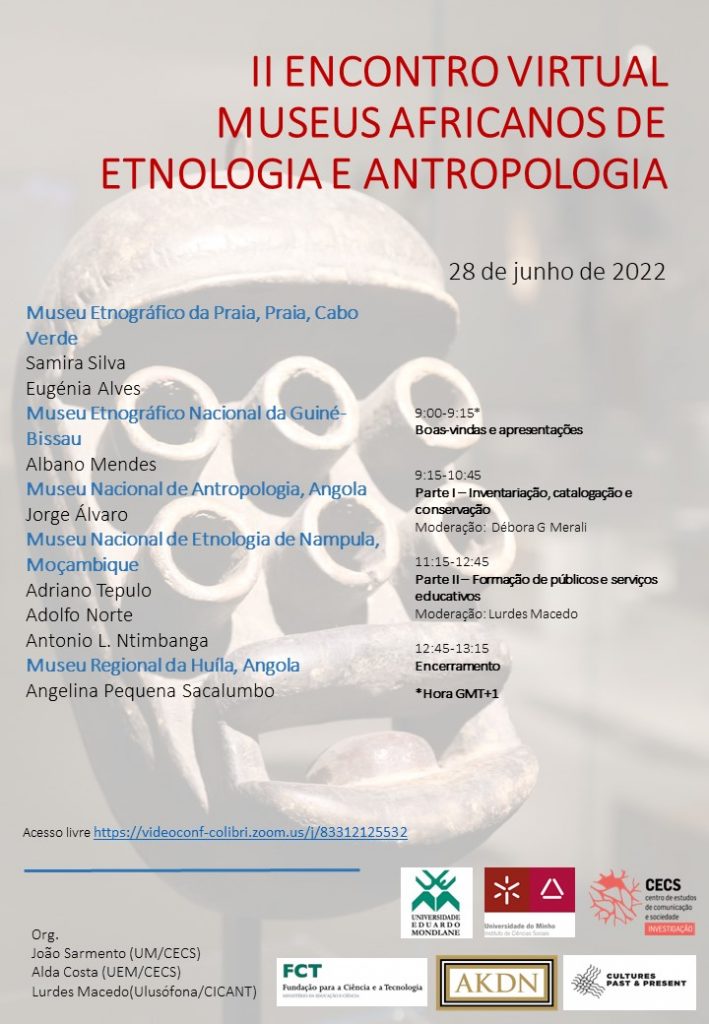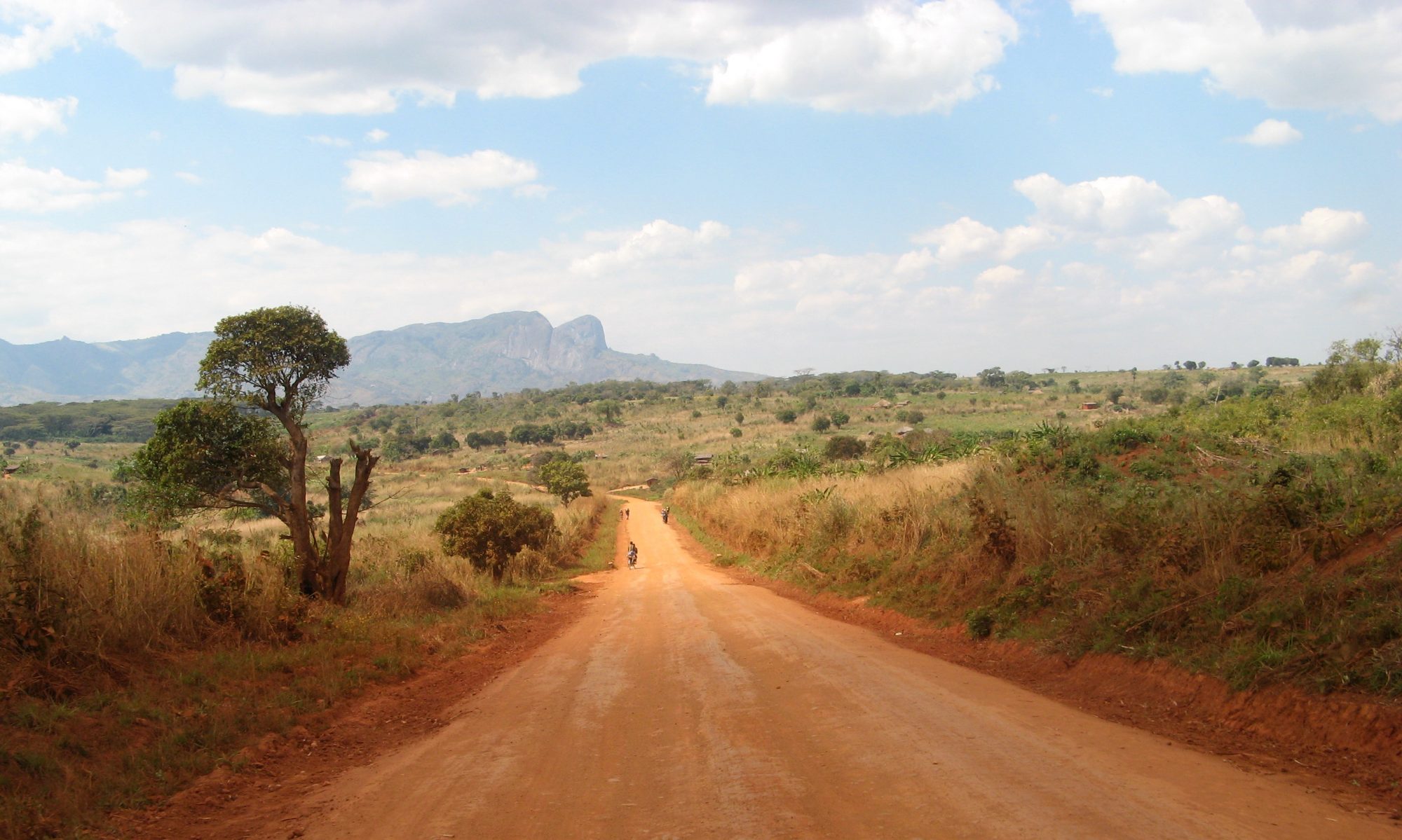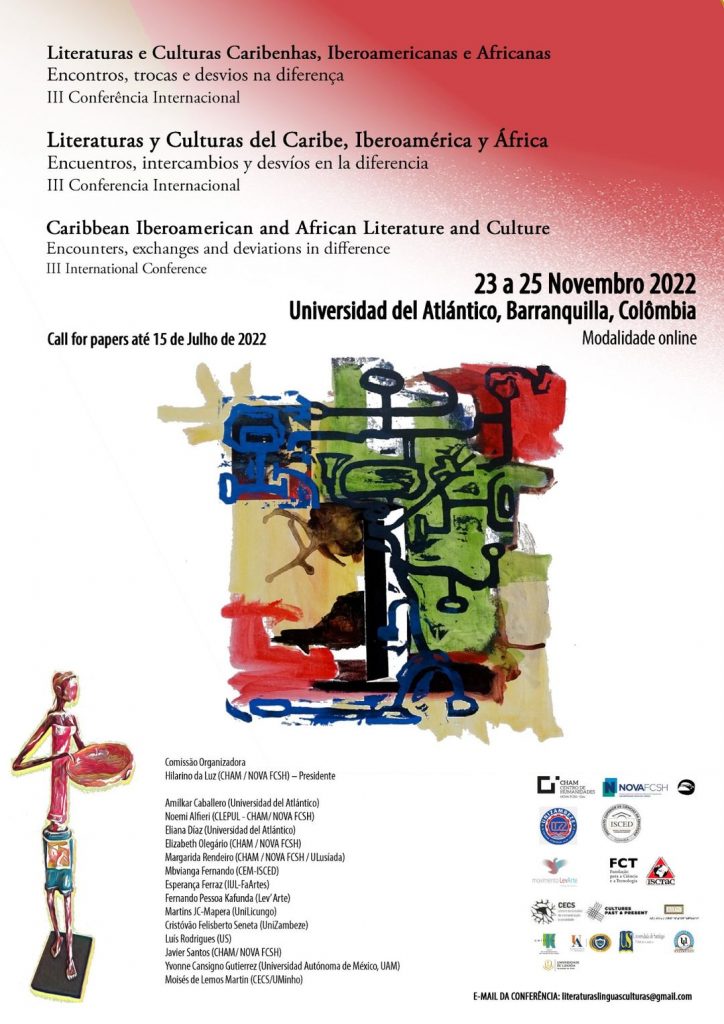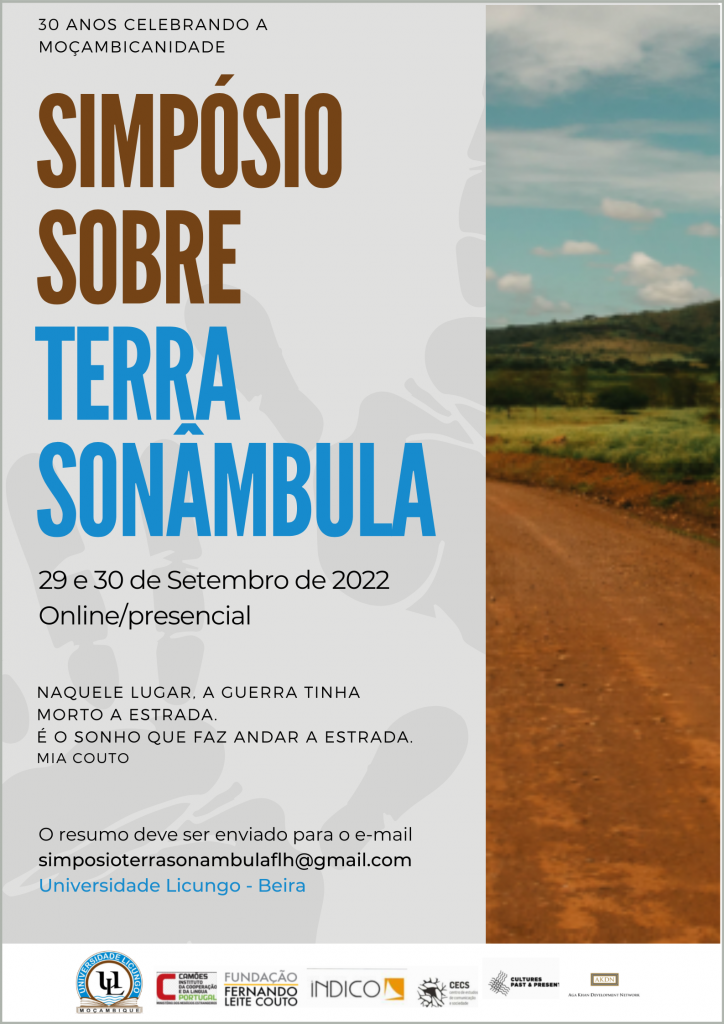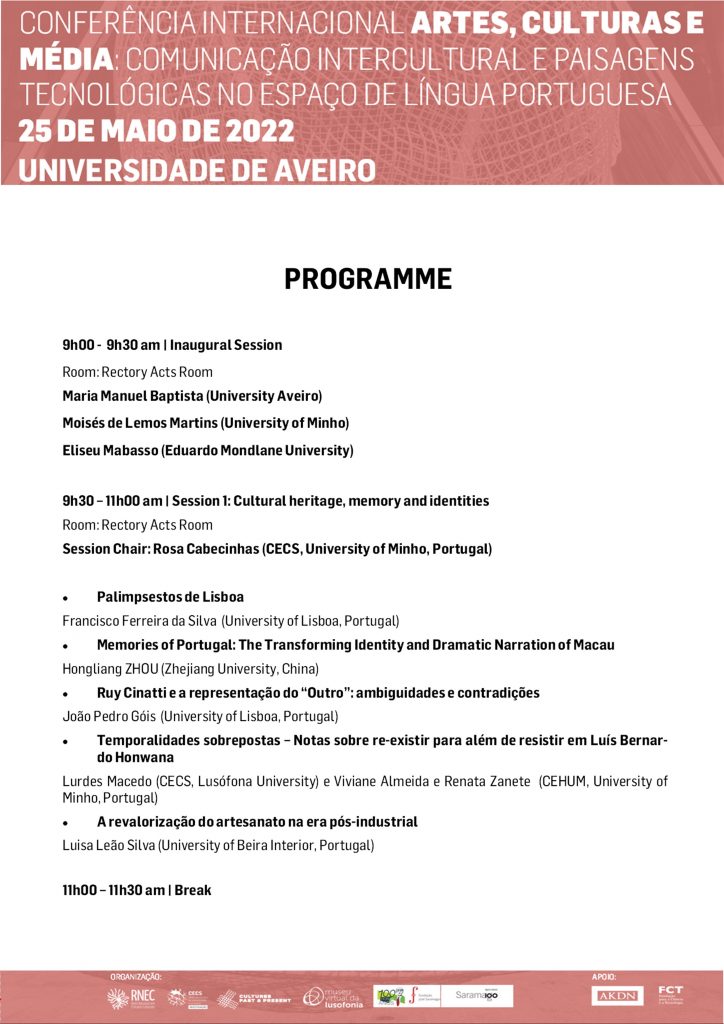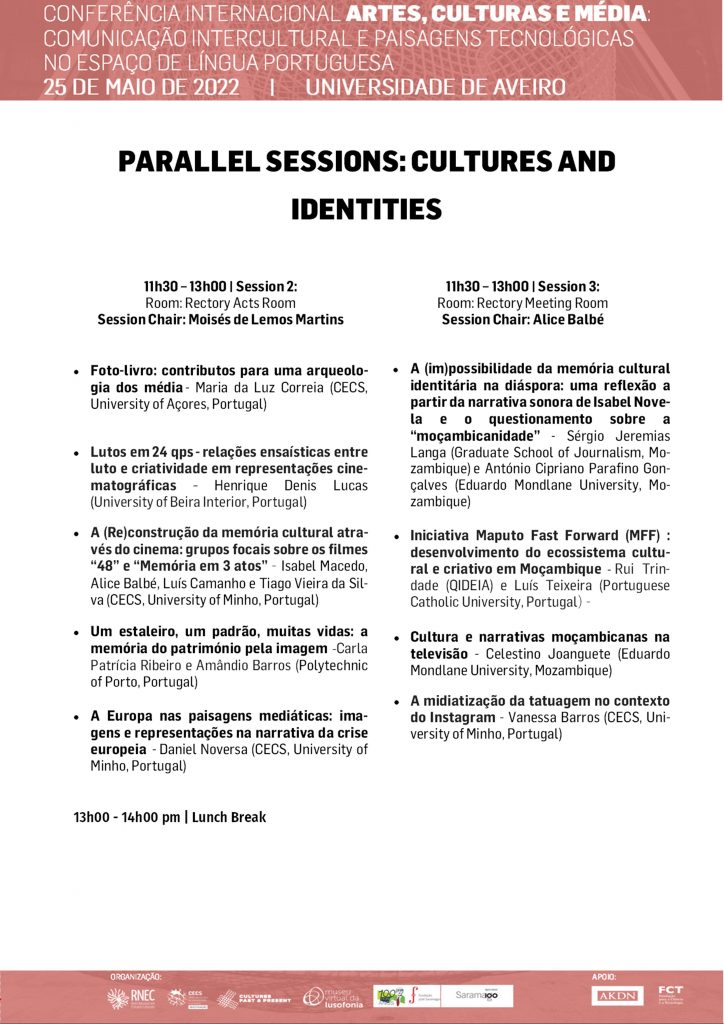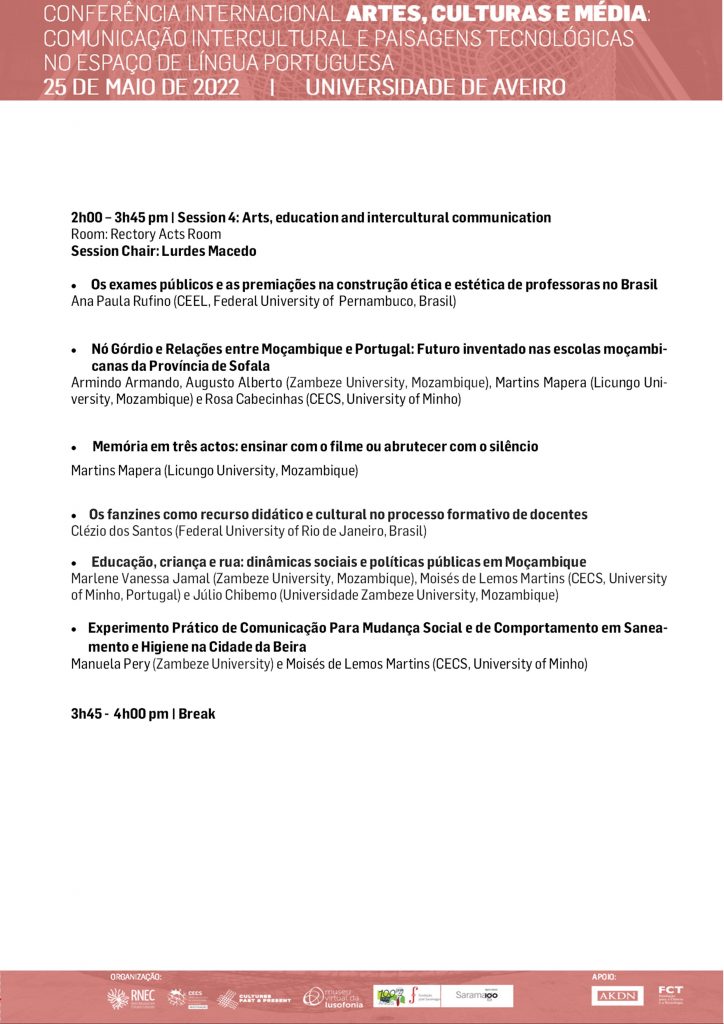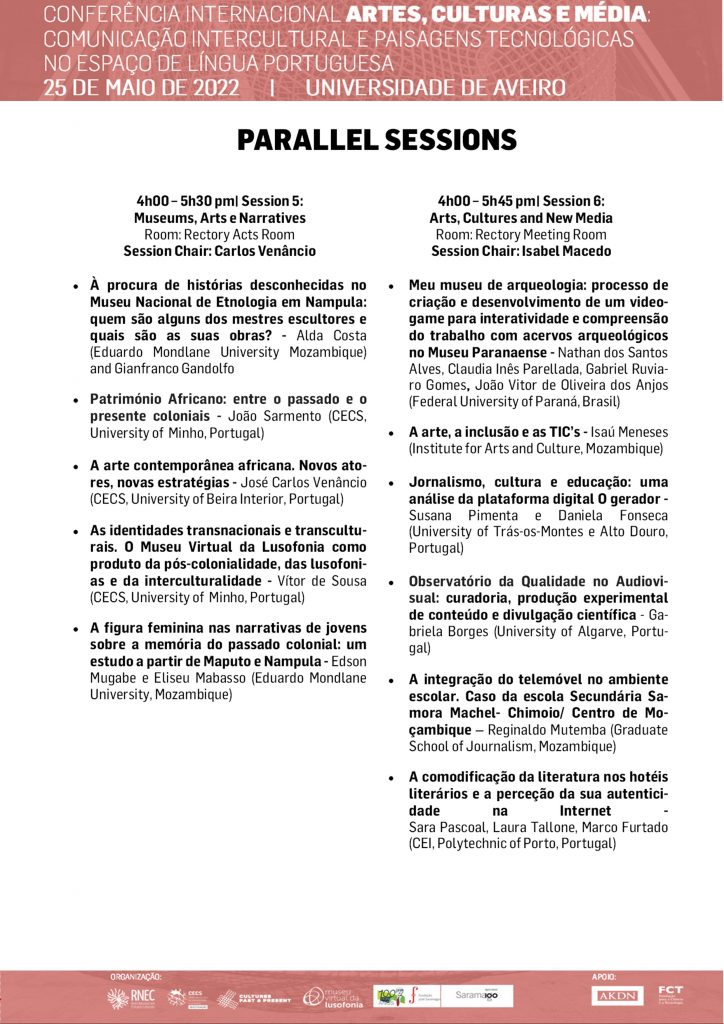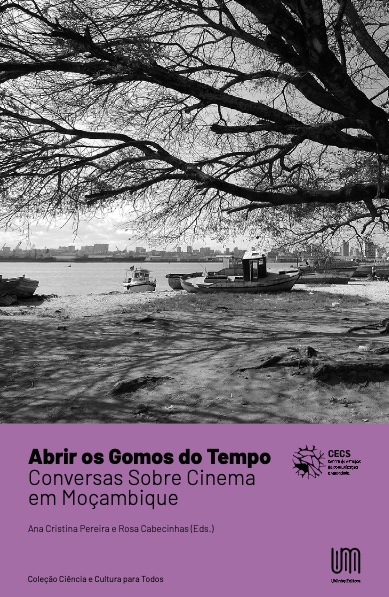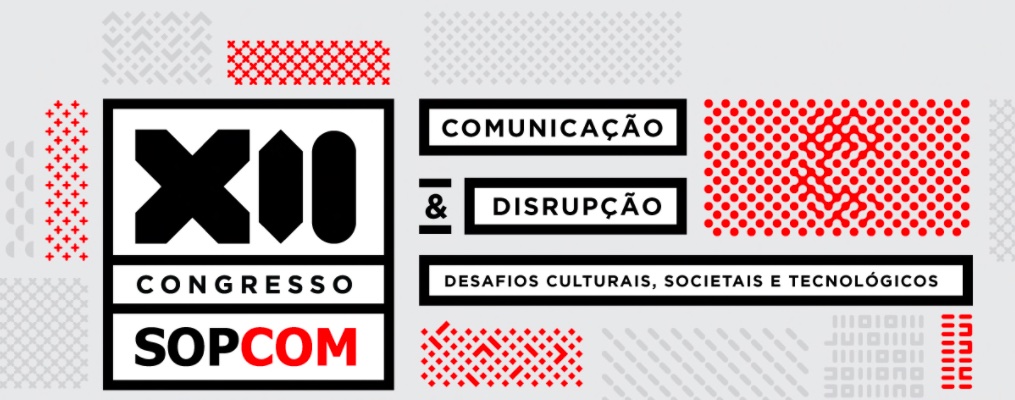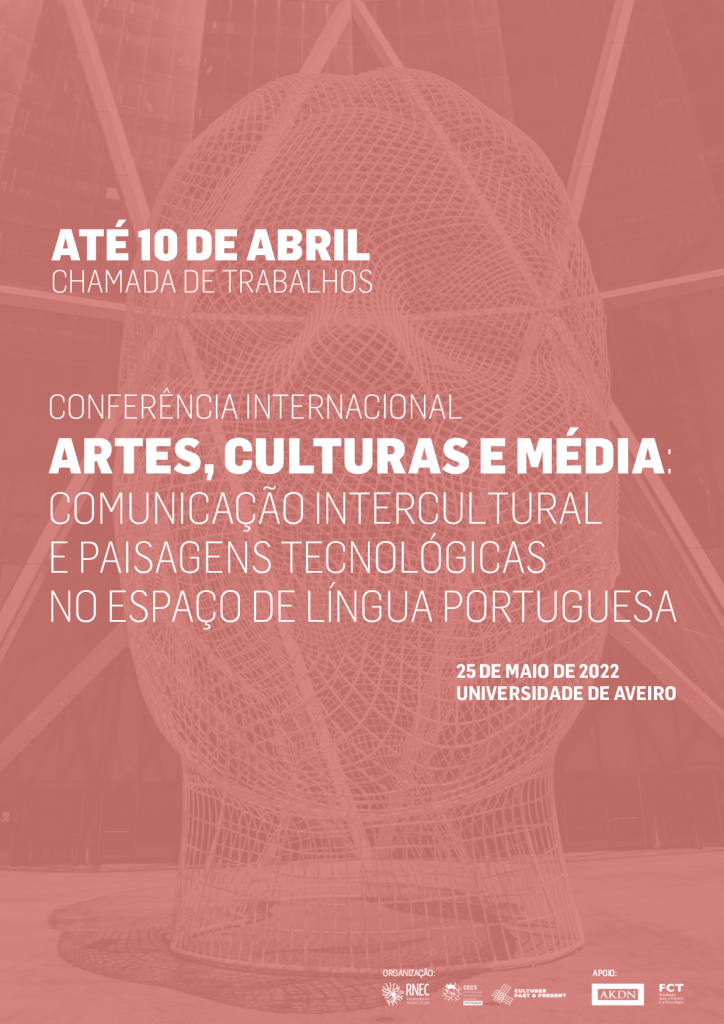On May 25, 2022, will be held the International Conference “Arts, Cultures and Media: Intercultural Communication and Technological Landscapes in the Portuguese-Speaking World”, in the scope of the project “Memories, cultures and identities: how the past weights on the present-day intercultural relations in Mozambique and Portugal?”. The conference will take place at the Rectory building of Aveiro University.
See the provisional programme:
9h – 9h30 am| Inaugural Session
Rectory’s Sala de Atos
Maria Manuel Baptista (University of Aveiro, Portugal)
Moisés de Lemos Martins (CECS, University of Minho, Portugal)
Eliseu Mabasso (Eduardo Mondlane University , Mozambique)
9h30 – 11h am| Session 1: Cultural heritage, memory and identities
Room: Rectory’s Sala de Atos
Palimpsestos de Lisboa – Francisco Ferreira da Silva (University of Lisbon, Portugal)
Memories of Portugal: The Transforming Identity and Dramatic Narration of Macau – Hongliang ZHOU (Zhejiang University, China)
Ruy Cinatti e a representação do “Outro”: ambiguidades e contradições – João Pedro Góis (University of Lisbon, Portugal)
Temporalidades sobrepostas – Notas sobre re-existir para além de resistir em Luís Bernardo Honwana – Lurdes Macedo (CECS, Lusófona University), Viviane Almeida (CEHUM, University of Minho, Portugal) e Renata Zanete (CEHUM, University of Minho, Portugal)
A revalorização do artesanato na era pós-industrial – Luisa Leão Silva (University of Beira Interior, Portugal)
11h am- 11h30 am | Break
11h30 am – 1h pm | Session 2: Cultures and Identities
Room: Rectory Acts Room
Foto-livro: contributos para uma arqueologia dos média – Maria da Luz Correia (CECS, University of Azores, Portugal)
Lutos em 24 qps – relações ensaísticas entre luto e criatividade em representações cinematográficas – Henrique Denis Lucas (University of Beira Interior, Portugal)
A (Re)construção da memória cultural através do cinema: grupos focais sobre os filmes “48” e “Memória em 3 atos” – Isabel Macedo, Alice Balbé, Luís Camanho e Tiago Vieira da Silva (CECS, University of Minho, Portugal)
Um estaleiro, um padrão, muitas vidas: a memória do património pela imagem – Carla Patrícia Ribeiro e Amândio Barros ( Polytechnic of Porto)
A Europa nas paisagens mediáticas: imagens e representações na narrativa da crise europeia – Daniel Noversa (CECS, University of Minho, Portugal)
11h30 am – 1h15 pm | Session 3: Cultures and Identities
Room: Rectory Meeting Room
A (im)possibilidade da memória cultural identitária na diáspora: uma reflexão a partir da narrativa sonora de Isabel Novela e o questionamento sobre a “moçambicanidade” – Sérgio Jeremias Langa (Escola Superior de Jornalismo, Moçambique) e António Cipriano Parafino Gonçalves (Universidade Eduardo Mondlane, Moçambique)
Iniciativa Maputo Fast Forward (MFF) : desenvolvimento do ecossistema cultural e criativo em Moçambique – Rui Trindade (QIDEIA) e Luís Teixeira (Universidade Católica Portuguesa, Portugal)
Cultura e narrativas moçambicanas na televisão – Celestino Joanguete (Universidade Eduardo Mondlane, Moçambique)
A midiatização da tatuagem no contexto do Instagram – Vanessa Barros (CECS, Universidade do Minho, Portugal)
1h pm- 2h pm | Lunch Break
2h pm – 3h45 pm| Session 4: Arts, education and intercultural communication
Room: Rectory’s Sala de Atos
Os exames públicos e as premiações na construção ética e estética de professoras no Brasil – Ana Paula Rufino (CEEL, Universidade Federal de Pernambuco, Brazil)
Nó Górdio e Relações entre Moçambique e Portugal: Futuro inventado nas escolas moçambicanas da Província de Sofala – Armindo Armando, Augusto Alberto (Zambeze University,, Moçambique), Martins Mapera (Licungo University, Mozambique) e Rosa Cabecinhas (CECS, University of Minho)
Memória em três actos: ensinar com o filme ou abrutecer com o silêncio – Martins Mapera (Licungo University, Mozambique)
Os fanzines como recurso didático e cultural no processo formativo de docentes – Clézio dos Santos (Universidade Federal do Rio de Janeiro, Brazil)
Educação, criança e rua: dinâmicas sociais e políticas públicas em Moçambique – Marlene Vanessa Jamal (Zambeze University, Mozambique), Moisés de Lemos Martins (CECS, University of Minho, Portugal) e Júlio Chibemo (Zambeze University, Mozambique)
Experimento Prático de Comunicação Para Mudança Social e de Comportamento em Saneamento e Higiene na Cidade da Beira – Manuela Pery (Universidade Zambeze) e Moisés de Lemos Martins (CECS, University of Minho)
3h45 -4h pm | Break
4h pm – 5h30pm | Session 5: Museums, Arts and Narratives
Room: Rectory’s Sala de Atos
À procura de histórias desconhecidas no Museu Nacional de Etnologia em Nampula: quem são alguns dos mestres escultores e quais são as suas obras? – Alda Costa (Universidade Eduardo Mondlane, Moçambique) & Gianfranco Gandolfo
Património Africano: entre o passado e o presente coloniais – João Sarmento (CECS, Universidade do Minho, Portugal)
A arte contemporânea africana. Novos atores, novas estratégias – José Carlos Venâncio (CECS, Universidade da Beira Interior, Portugal)
As identidades transnacionais e transculturais. O Museu Virtual da Lusofonia como produto da pós-colonialidade, das lusofonias e da interculturalidade – Vitor de Sousa (CECS, Universidade do Minho, Portugal)
A figura feminina nas narrativas de jovens sobre a memória do passado colonial: um estudo a partir de Maputo e Nampula – Edson Mugabe e Eliseu Mabasso (Universidade Eduardo Mondlane, Moçambique)
4pm – 5h45 pm| Sessão 6: Arts, cultures and new media
Room: Meeting Room of the Rectory
Meu museu de arqueologia: processo de criação e desenvolvimento de um videogame para interatividade e compreensão do trabalho com acervos arqueológicos no Museu Paranaense – Nathan dos Santos Alves, Claudia Inês Parellada, Gabriel Ruviaro Gomes, João Vitor de Oliveira dos Anjos (Universidade Federal do Paraná, Brazil)
A arte, a inclusão e as TIC’s – Isaú Meneses (Institute for Arts and Culture, Mozambique)
Jornalismo, cultura e educação: uma análise da plataforma digital O gerador – Susana Pimenta e Daniela Fonseca (University of Trás-os-Montes e Alto Douro, Portugal)
Observatório da Qualidade no Audiovisual: curadoria, produção experimental de conteúdo e divulgação científica – Gabriela Borges (University of Algarve, Portugal)
A integração do telemóvel no ambiente escolar. Caso da escola Secundária Samora Machel- Chimoio/ Centro de Moçambique – Reginaldo Mutemba (Graduate School of Journalism, Mozambique)
A comodificação da literatura nos hotéis literários e a perceção da sua autenticidade na Internet – Sara Pascoal, Laura Tallone, Marco Furtado (CEI, Polytechnic of Porto, Portugal)
6h pm – 6h30pm | Book Presentation
Presentation: Maria Manuel Baptista (University of Aveiro, Portugal)
Presentation of the book “Abrir os Gomos do Tempo: Conversas Sobre Cinema em Moçambique”, edited by Ana Cristina Pereira and Rosa Cabecinhas (CECS, University of Minho, Portugal)
6h30 pm | Closure Session
8h30 pm| Cinema session and debate
Room: Rectory’s Sala de Atos
Moderation: Moisés de Lemos Martins
Screening of the film O Ano da Morte de Ricardo Reis with the presence of director João Botelho, as part of writer José Saramago’s centenary and the initiative “100 hours with Saramago”. The event is organised jointly with the Virtual Museum of Lusophony, the University of Madeira, the Mackenzie University of São Paulo, and the University of Minho.
Registration is free and can be done using the form: here.
Organization:
Memories, cultures and identities: how the past weights on the present-day intercultural relations in Mozambique and Portugal?” (Cultures Past & Present)
CECS – Communication and Society Research Centre
RNEC – Rede Nacional em Estudos Culturais
